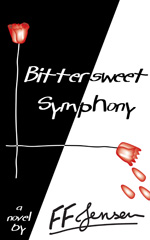A couple of days ago, I had a great convo with a former Rugby Union legend, Enrique ‘Topo’ Rodríguez, which in itself deserves at least three blog posts. We discussed how a persona can preserve the person, in other words, how a pseudonym—my pseudonym, FF Jensen—allows a human being—in this case, the ‘real’ me—to strike out into a new arena—creative writing—keeping all other aspects of my private life away from intruding eyes—in other words, still private.
There’s also a very pressing reality: I need to pay my bills and I can’t make a living out of my creative writing just yet. My current supervisor-coordinator, or whatever you want to call them, has given me enough proof of narrow-mindedness and judgmentalism (Yuppy! I have invented a great word) and I never know what may come in my direction. Someone said, ‘Just because you’re paranoid doesn’t mean they aren’t out to getcha.’ Problem is that in this case I’ve got more than enough evidence to mistrust this person.
In any case, there’s a fun story behind my nom de plume that I’d love to share with you: As soon as I finished writing ‘Bittersweet Symphony’ and knew that publication under my real name was a no-no, I started ‘shopping around’ for a pen name. I whiled my time away on the Behind the Name website, marvelling at how all the different random combinations kept coming, but there was nothing there that truly tickled my fancy. No ‘Yes!’ or ‘Eureka!’ moment.
A rather unconnected event brought in exactly what I was after. My partner is a member of a specialist forum where his nickname was abbreviated to ‘FF’. On a couple of occasions, I posted messages under my partner’s username, and one of his mates suggested I get my own username for that forum. It was the first time in my life I posted online under someone else’s name, which isn’t like me at all. I’ve been online since 1995 and never used ‘proxies’ (I surely used proxy servers, though). I’ve always been me, never anybody else (Hehe, my ‘digital fingerprints’ are everywhere now … If I were a ‘person of interest’ for the NSA, they’d catch me at the drop of a hat).
Whatever, you must be thinking. Cut to the chase, FF! Where does your pen name come from?

One of my partner’s friends posted a pic of a Jensen FF on that specialist forum. I can’t remember how it happened exactly, but the suggestion was that since I am Mr FF’s missus, I should join that forum as Jensen FF. The joke was over in less than ten minutes, but a ‘little seed’ was planted in my subconscious.
Back in January this year, I had a weird eureka moment. One morning, as soon as I woke up, I told my partner, ‘I think that my pseudonym should be FF Jensen.’ His reply was, ‘Honey, that might work.’ In a matter of days, I got the domain name for my website and started developing it. I even received an email from someone who wanted to buy spare parts for the Jensen FF! Hilarious …
Mind you, FF Jensen is pretty well established, but I sometimes find myself thinking whether I should publish my raunchy short stories under a different nom de plume. Or whether at some stage I’ll be happy to flaunt my real name. Who knows…? In any case, who cares? I don’t. The main thing is to keep on writing and enjoying it, all the while keeping the ‘head honcho’ in the dark.
Cheers, FFJ (from the Blue Mountains train)


